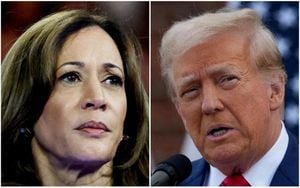With Donald Trump's recent win as the 47th president of the United States, excitement has ignited among conservative circles, particularly with regard to the future of the Supreme Court. Trump, having secured the presidency once again, now finds himself with not just the responsibility of leading the country, but potentially reshaping the judiciary for decades to come. His victory is anticipated to facilitate the appointment of even more conservative judges to the federal courts, advancing the Trump administration's judicial legacy from his first term.
During his initial presidency, Trump appointed 234 judges across the federal system, including three justices to the Supreme Court. The prospect of his second term, coupled with the Republican majority established following the recent elections, positions Trump with significant authority to fill judicial vacancies. This shift presents Republicans with the opportunity to confirm additional conservative judges swiftly, without the prolonged debates often seen under Democratic leadership.
Trump's return to the White House, alongside Republican control of the Senate, has set the stage for potentially swift confirmation of his judicial nominees. The Senate has gained at least 52 Republican seats, which will allow for smoother pathways for appointments, unfettered by moderate dissent from party members like Susan Collins of Maine or Lisa Murkowski of Alaska. Experts suggest this second chance for Trump may open doors to appointing younger justices, capable of holding their seats for extended periods. This reconfiguration is particularly important as current justices such as Samuel Alito and Clarence Thomas—both over 70—might retire, which would allow Trump to name successors who could maintain or even bolster the court's conservative stance.
The dynamics within the Republican Party also indicate a strong backing for Trump's judicial ambitions. Notably, Senate Judiciary Committee chairman Charles Grassley, supported by Trump-aligned congressional leaders, seems poised to lead efforts to confirm judges with conservative ideologies. Grassley's leadership suggests aggressive action will be taken to reinforce law and order and reshape the nation's judiciary swiftly. He has showcased his commitment to prioritizing judicial confirmations as part of his agenda, highlighting the Republican strategy to solidify conservative ideals within the federal courts.
Trump's first term saw his nominees leaning significantly toward conservatism, particularly when compared to previous Republican appointees. Experts like John P. Collins Jr., law professor at George Washington University, predict this trend will continue, possibly with even more conservative selections. The former president has reportedly struggled to maintain close ties with mainstream conservative networks like the Federalist Society, which initially aided his judicial nominations, and this might open the door for him to select candidates who adhere more strictly to his interpretations of conservative law.
Speculations about potential appointments are already stirring excitement and concern. Should justices Alito and Thomas retire under Trump's administration, they would likely be replaced by judges who not only share their conservative viewpoints but are considerably younger, potentially extending the conservative influence on the court for generations. "Assuming they both step down, I’d bet the farm on it; Trump will appoint their replacements, and they'd be at least as conservative, but 30 years younger," Collins emphasized, foreseeing major strategic shifts influenced by Trump's selections.
Even without immediate retirements, the current court setup lends itself well to Trump's influence. While the court's current 6-3 conservative majority won't change with his appointments of replacements, the potential selection of younger judges can set the course for the law long-term. Should seats become available due to various reasons—including possible health concerns or outright resignations—those choices will be pivotal. Currently, the other justices on the court also fall within aging demographics, with Sonia Sotomayor at 70 and Chief Justice John Roberts at 69.
Trump’s new nominations might also be aimed at fulfilling more than just conservative ideologies. Reports suggest he has grown frustrated with some of his prior appointees for their perceived independence, indicating he might look for appointees willing to align closely with his political objectives. This could mean his second-term nominees are chosen not merely on traditional conservative grounds but with the intent to promote specific policy agendas as well.
The partisan environment makes it highly unlikely for any significant measures proposed by Democrats, including attempts to change the court’s makeup or impose term limits, to succeed. Given the Republican Senate majority, these reforms—which had already seemed far-fetched—are now virtually impossible. The atmosphere is ripe for Republicans to solidify their conservative foothold not just for the current term but as policy perspectives stretch far beyond, potentially maintaining this judiciary orientation for decades.
Public perception of the court is also shifting amid these political maneuvers. Recent survey results depict growing dissatisfaction with the Supreme Court’s decisions. Some of these landmark decisions, such as the overturning of Roe v. Wade and assertions of presidential immunity from prosecution, have fueled protests and requests for accountability, leading to woes about judicial integrity among the populace. Yet, under Trump’s leadership, there’s anticipation of more conservative rulings, irrespective of public confidence.
Historically, if Trump can enact two Supreme Court nominees during his second term, it would place him as the president with the highest number of judicial appointments since Franklin D. Roosevelt. Each diary entry for this saga is but pressing forward as many Americans remain skeptical or supportive of Trump’s approach and the incoming conservative judges they may usher in.
There’s uncertainty surrounding how the new court appointments could impact key social issues, with the anticipation of rights and protections being pressed to the sidelines as conservative ideology takes the forefront. Grassley and Republican leaders have indicated they will prioritize what they perceive as ‘constitutional’ judges, likely prioritizing appointments aligned with their ideology and priorities over demographic diversity or broader perspectives.
What remains especially compelling is the pause on the possible shifts within the Democratic response. Following Trump’s victory, discussions within Democratic circles have reignited arguments for replacing aging justices prior to mounting another uphill battle for confirmation. Justice Sonia Sotomayor's age and possible succession have come under the spotlight as cries for her to retire intensify among some progressives, though it appears unlikely there would be immediate actions taken on her part.
Trump's upcoming second term transformation plan expands beyond just social conservatism, as he aims for comprehensive reform across various sectors, including immigration, healthcare, and international relations. His administration’s judicial picks will serve as just one avenue through which his influence might propagate through the institutions of American governance, leaving citizenry to wield any semblance of power back. The personalities and philosophies entering rulings and shaping laws for years to come now rest upon the preferences emanated from what the American public determined through ballots. Time will tell how indelible the marks from these judicial battles will be, but for now, the future of the Supreme Court remains decisively positioned under Trump’s influence, steering toward conservative seas.



